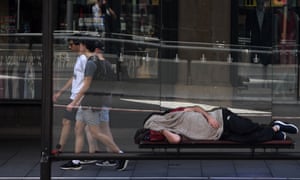After almost 24 years in the welfare sector, I believe the group we hate more than any other is the poor
In August, Tanya Gersh, represented by the Southern Poverty Law Centre, was awarded $14m in a lawsuit against Andrew Anglin, the publisher of the neo-Nazi website the Daily Stormer, for encouraging “an online anti-Semitic harassment and intimidation campaign” against Gersh and her family.
Anglin has been here before; there are two other judgments against him for hate speech. In one case, the presiding judge ruled that Anglin “acted with actual malice when they published false statements, with knowledge of the falsity of those statements or with reckless disregard for the truth”.
We have also been here before; we recognise the malice, the deceit
and the breathtaking, unremitting cruelty that is hate crime. But these
characteristics and the very act of hatred itself do not exist within
the narrow periphery on societies’ extremist edges. Hate is part of how
we conduct our politics and structure our societies.Anglin has been here before; there are two other judgments against him for hate speech. In one case, the presiding judge ruled that Anglin “acted with actual malice when they published false statements, with knowledge of the falsity of those statements or with reckless disregard for the truth”.
The use of hate in society is a complex phenomenon, but psychologically, who and why we hate is much clearer. The motive of hate is to eliminate the other, whether that be real or symbolic. Hate evolves out of both real and imagined threats. When we hate another, we don’t just hate what they do, we hate who they are: we see them as inherently bad, morally inferior and we believe their intention towards us is malicious. What we hate about the other is their imagined innate nature. Once we come to hate, the hatred persists.
Psychologically speaking, hate has much more currency as a group feeling than an individual one. Hate is the great social glue that binds people together. Research demonstrates that socially, once unleashed, hate can permanently destroy relationships, and that misconceptions and biases once formed against an outgroup don’t necessarily change on meeting people from that group. Hate, like an emotional injury, leaves scars, not just on the hated, but also the hater. At the group level, we hate those who are different from us. We don’t need to know a person to hate them because of what we perceive them to represent.
"While we will speak about the system and class, we will not name the very special and resilient hate we have for the poor"
There is nothing within the emotion of hate that is constructive or redemptive like other negative human emotions. It destroys both the hater and the hated.
Hate and the persecution of minorities is something we appear to have accepted as part of our societies; racism, misogyny and the wide array of antis and phobias – such as antisemitism, anti-Arabism, or xenophobia, homophobia, Islamophobia and transphobia – is hardly an exhaustive list of our capacity to hate.
These terms help to concentrate the mind on how power and inequality operate in society, and what catastrophic impact the use of hate has in creating social hierarchies. But these terms, like hate crimes and hate speech, can also blind us to both what hate is and how pervasive it is in our society. We seem unaware that hate can operate even when a hate crime, or one of the phobias or antis isn’t obviously present. This failure means that how hate is deployed in society is obfuscated.
Not all forms of hate in Australia are accounted for and proscribed: for example, after almost 24 years in the welfare sector, I believe with certainty that the group we hate more than any other group in society is the poor. We are both righteous about and entitled to an opinion about those who are poor, and while we will speak about the system and class, we will not name the very special and resilient hate we have for the poor.
How could government actions towards welfare recipients, such as drug testing, withdrawing income for speaking out, subjecting them to inhumane treatment at the hands of a Kafkaesque state be called anything other than hateful? Everything in this government’s actions leads one to believe that poverty is something that cannot be forgiven or go unpunished.
Similarly, when Israel Folau states that hell awaits “drunks, homosexuals, adulterers, liars, fornicators, thieves, atheists, idolaters”, religious conservatives respond not by drawing a line between faith and hate, but by campaigning to enshrine their view of faith and protect their right to hate through legislation. As a woman of faith, I hear hate, not faith, because I know it is possible to hold an alternative view without that view violating one’s beliefs. But the confusion is so complete that the Australian Human Rights Commission can only state: “However, it is important that our laws do not give preference to one human right over others”, demonstrating how complete and absolute its failure is to understand hate.
The exercise of hate masquerading as something else is endemic in Australian political life – but how we do know when something is hate? As the above examples reveal, society appears to have treated both poor and LGBTIQ communities with malice, deceit and unremitting cruelty. Perhaps it is best encapsulated by Gersh: “No one should be terrorised for simply being who they are.”
• Joumanah El Matrah is PhD student at Western Sydney University and former CEO of the Australian Muslim Women’s Centre for Human Rights

No comments:
Post a Comment